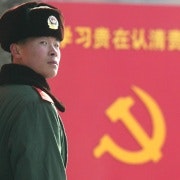Mercantilist mindset makes good China policy
While the Abbott government trumpets its China-Australia free trade agreement win, it continues to stumble over the non-commercial aspects of China policy.
The latest diplomatic misstep involved Prime Minister Tony Abbott's embarrassingly naïve enthusiasm for what he mistook to be Chinese President Xi Jinping's commitment to a fully democratic China.
This combination of economic successes and diplomatic blunders seems to justify concerns that Canberra needs to develop a more diversified and nuanced relationship with Beijing that goes beyond exporting rocks, crops and photo ops.
And yet the combination of the government's mercantilist mindset and Australia's natural advantages as a middle power that is historically estranged from China means that the rationale for revamping Canberra's approach to the Sino-Australian relationship remains weak.
The government has not just chosen to focus on economic ties as the cornerstone of the Sino-Australian relationship because of the sheer scale and potential of Australia's booming trade ties with China—more than $150 billion in annual two-way trade, and counting.
Shared commercial interests are also the logical keystone of Australia's relations with China for want of other options.
Beyond the economic realm, China and Australia are divided by deep strategic and ideological disagreements.
In the East and South China seas and on the Indian subcontinent, China shows scant interest in the peaceful mediation of territorial disputes and established norms of international law, and is instead intent on gaining control of disputed territory through sabotage, border incursions, and other bullyboy tactics.
Beijing also advocates a ‘New Asian Security Concept' in which Asian nations would be less militarily enmeshed with the United States, and China would equally welcome the end of the US-led Asian alliance system on which Australia's security depends.
At the same time, the Chinese Communist Party is committed to perpetuating the Leninist one-party state and ruthlessly crushing political dissent and supressing sub-national ethnic and religious identities that it fears could challenge its monopoly on political power and divide the nation.
Beijing understands as well as Canberra that China and Australia have different strategic interests and ideological affinities, and therefore welcomes the emphasis on the ‘win-win' economic upside of the relationship.
Like the Abbott government's signature foreign policy of directing diplomatic resources towards advancing Australia's economic interests, Chinese diplomacy is driven by the commercial impulse to develop mutually beneficial trade and investment links.
Beyond this shared mercantilist mindset with Beijing, Canberra enjoys natural advantages over other regional capitals when it comes to engaging with China.
Past wars and bitter historical grievances stemming from these conflicts still weigh on Beijing's relations with New Delhi, Hanoi and Tokyo. Meanwhile, China is locked in contentious territorial disputes with many of Asia's great and middle powers, including India, Malaysia, the Philippines, Vietnam and Japan.
Aside from the limited involvement of Australian forces in the international effort to suppress the Boxer Rebellion, Australia has never fought a war with China, and obviously has no territorial disputes with the Middle Kingdom.
Moreover, Australia's status as a middle power reduces the diplomatic costs associated with Canberra's strategic and ideological disagreements with Beijing.
Canberra rightly raises concerns about Beijing's human rights violations and attempts to upset Asia's territorial status quo.
But with the United States taking a consistently strong stand against China's disregard for basic human rights and aggressive tactics in territorial disputes, Australia can afford to ‘lead from the middle' when it comes to voicing support for liberal internationalist principles.
This modest middle power strategy of letting the United States do the heavy lifting on matters of strategic and ideological disagreement with China allows Australia to quietly defend its strategic interests and liberal democratic values while also minimising friction in the Sino-Australian relationship.
Of course, Australia's relations with China were far from smooth in 2014.
The year started with Foreign Minister Julie Bishop's tortured attempts to argue that the United States is a better economic friend than China. This was followed by Abbott's ill-advised praise for Japanese submariners killed in the attack on Sydney in 1942 and the government's initially skittish response to the Chinese proposal for the Asian Infrastructure Investment Bank.
Despite these and other surface-level hiccups, the fundamentals of the Sino-Australian relationship are in excellent health.
By placing the economic narrative of mutual prosperity at the heart of Australia's relations with China and using a quiet middle power voice to broach strategic and ideological disagreements, the government can comprehensively debunk the myth that it must move beyond its mercantilist mindset to maintain warm and productive relations with Beijing.
Dr Benjamin Herscovitch is a Beijing-based Research Fellow at The Centre for Independent Studies.















